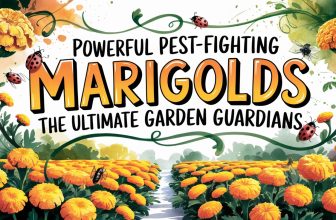Unleash Nature's Wrath: Eradicate Slugs in Your Garden
Are slugs wreaking havoc in your garden, leaving a trail of destruction in their wake? You're not alone in this battle against these relentless plant-eating creatures.
But fear not, for there are natural and effective ways to combat their invasion. By implementing proven methods and strategies, you can reclaim your garden and protect your plants from the relentless onslaught of slugs.
Stay tuned to discover how to unleash nature's wrath and eradicate these pesky pests, once and for all.
Natural Slug Control Methods
To naturally control slugs in your garden, consider implementing a range of effective and environmentally friendly methods.
Using natural predators to control the slug population can be highly effective. Encouraging birds, frogs, and snakes to thrive in your garden can help keep the slug numbers in check.
Additionally, the effectiveness of copper tape in deterring slugs is well-documented. When slugs come into contact with the copper, they receive a tiny electric shock that repels them. By strategically placing copper tape around vulnerable areas of your garden, you can create a barrier that deters slugs from reaching your plants.
These natural methods not only help control slug populations but also contribute to a healthier and more balanced garden ecosystem.
Organic Solutions for Slug Prevention
Implementing organic solutions for slug prevention can further enhance the natural balance of your garden ecosystem, building on the foundation of natural slug control methods previously discussed. Utilize plants as natural slug repellents and consider biological methods for slug control to maintain a thriving garden.
| Organic Slug Prevention Methods | Description | Benefits |
|---|---|---|
| Using Plants as Natural Slug Repellents | Plant strongly-scented or bitter plants like salvia and fennel, as well as those with furry or prickly stems and leaves. | Natural and environmentally friendly way to deter slugs from damaging your garden. |
| Slug Control Using Biological Methods | Encourage natural predators like birds, frogs, and snakes to control the slug population. Consider using nematodes, microscopic organisms that naturally control slug populations. | Maintains the natural balance of your garden ecosystem while effectively managing slug populations. |
Slug-Resistant Plant Selection
When choosing slug-resistant plants for your garden, prioritize those with natural defenses such as strong scents, furry or prickly textures, or thick and waxy leaves. By selecting slug-resistant plants, you can reduce the need for chemical interventions, maintain the balance of your garden ecosystem, and protect your plants from slug damage.
Look for plants like salvia, fennel, and succulents which naturally deter slugs. Opt for varieties like rosemary, anise, foxglove, and Japanese anemone that have natural toxins or latex fiber.
Additionally, consider companion planting to distract slugs from precious plants, using decoy plants strategically.
These tips for selecting the most effective slug-resistant plants won't only benefit your garden but also contribute to a healthier and more sustainable gardening approach.
Companion Planting to Deter Slugs
You can effectively deter slugs in your garden by strategically planting companion plants to distract them from your prized plants. Companion planting offers numerous benefits for your garden's overall health, including improved pollination, pest control, and enhanced nutrient uptake for neighboring plants.
When it comes to deterring slugs and other pests, certain companion plants stand out for their effectiveness in repelling these unwanted visitors. The best companion plants to deter slugs and other pests include marigolds, lavender, and garlic, as their strong scents and natural properties act as powerful repellents.
Alternative Gardening Techniques for Slug Reduction
Consider using raised beds and tall containers to create barriers against slugs, making it difficult for them to reach your plants. In tall container gardening, slugs have a harder time accessing your plants, reducing the risk of infestations. Additionally, incorporating sharp objects such as crushed eggshells, diatomaceous earth, or gravel around the base of your plants can act as deterrents for slugs. Here's a table to summarize these alternative gardening techniques:
| Technique | Description | Benefits |
|---|---|---|
| Raised Beds | Create barriers against slugs | Prevent slugs from reaching plants |
| Tall Containers | Make it difficult for slugs to access plants | Reduces risk of slug infestations |
| Sharp Objects as Deterrents | Crushed eggshells, diatomaceous earth, or gravel | Acts as deterrents for slugs |
Frequently Asked Questions
Are There Any Natural Predators of Slugs That I Can Attract to My Garden to Help Control the Slug Population?
You can attract natural predators like birds, frogs, and snakes to control the slug population in your garden. By maintaining a garden that encourages these predators, you can reduce the need for harmful chemicals.
This approach supports a healthy environment and ecosystem. Additionally, implementing alternative gardening techniques, such as raised beds and sharp objects, will create a less favorable environment for slugs, reducing their infestation.
Can I Use Diatomaceous Earth as a Natural Method to Kill Slugs in My Garden?
Yes, you can use diatomaceous earth as a natural method to kill slugs in your garden. It works by dehydrating and damaging their bodies.
Additionally, using salt directly on slugs can also help dry out their bodies.
Beer traps are another effective method to attract and trap slugs.
These natural approaches can help you control the slug population in your garden without resorting to harmful chemicals.
What Are Some Common Mistakes to Avoid When Using Organic Slug Bait in the Garden?
When using organic slug bait in your garden, common mistakes to avoid include:
- Overusing the bait, which can harm beneficial insects and wildlife.
- Being cautious not to place the bait where pets or children can access it.
It is important to:
- Avoid relying solely on slug bait.
- Incorporate natural predators and control methods into your garden.
This will help maintain a balanced ecosystem and effectively manage slug populations.
How Can I Effectively Use Mulch to Prevent Slugs From Infesting My Garden?
To effectively use mulch to prevent slugs from infesting your garden, consider its benefits and application tips.
Mulch acts as a barrier, making it difficult for slugs to move around. Choose slug-resistant plants and natural repellents to further deter them.
Apply a thick layer of mulch around vulnerable plants and regularly inspect for slug activity. Use pine needles, crushed eggshells, or coffee grounds as mulch alternatives to create an inhospitable environment for slugs.
Are There Any Specific Types of Containers or Raised Beds That Are More Effective in Reducing Slug Infestations?
You can use tall containers and raised beds to deter slugs by making it harder for them to reach your plants.
Additionally, regularly checking these containers and raised beds for slugs and removing them can help prevent infestations.
Encouraging natural predators like birds, frogs, and snakes can also be an effective method to control the slug population in your garden.
With these methods, you can effectively reduce slug infestations and protect your plants.
Conclusion
You now have the knowledge and tools to take back your garden from slugs.
By implementing natural control methods, organic solutions, and alternative gardening techniques, you can protect your plants and prevent further damage.
With slug-resistant plant selection and companion planting, you can create a garden that's less attractive to slugs.
Say goodbye to slug infestations and hello to a thriving, beautiful garden once again.
Disclaimer: GardeningNorm is a participant in the Amazon Services LLC Associates Program and may receive a commission if you purchase a product via a link on this page.. However, this does not impact our reviews.Read the full disclosure here.



